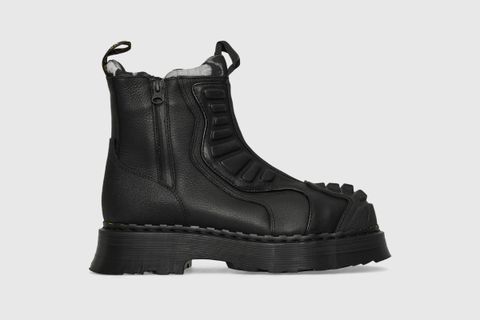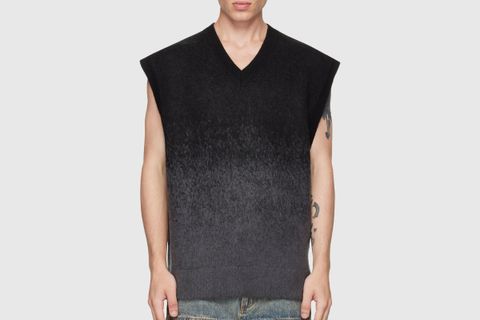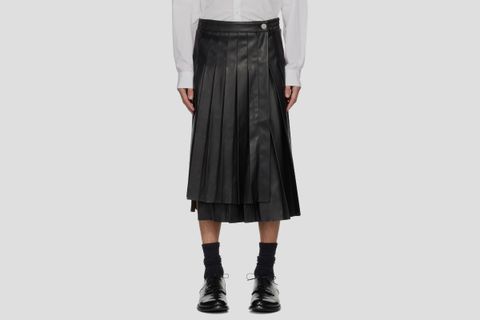Join the Dark Side: Designers Who Pioneered Dark Fashion
Imagine a realm where style takes on a deeper meaning, where expression finds its roots in the mysterious and the profound. Welcome to the compelling world of Dark Fashion. This isn't about ostentatious labels or casual flamboyance; this is a sphere where clothing takes on an eloquent narrative of its own.
Gothic Style Fashion invites you to a grand performance where each garment is a character, telling a story steeped in intrigue and elegance. Uniform yet fluid, it defies norms and plays with the ambiguous, breaking the bounds of conventionality. And at the heart of it, you'll find an intoxicating darkness—an exploration of the human experience that's beautifully nuanced and fearlessly genuine.
The creativity of the greats—Alexander McQueen, Boris Bidjan Saberi, Rick Owens, Yohji Yamamoto, Gareth Pugh—is rooted in the gothic narrative. Each a master of their craft, they transformed their personal musings and emotions into fashion masterpieces that encapsulate the gothic spirit.
And what's more symbolic of this ethos than the color black? Not just a mere hue, but a powerful symbol, black has commanded the fashion world for centuries. It's the heart of gothic style fashion, an unspoken language that conveys power, sophistication, and timelessness.
So for this year's spooky season, come embrace the captivating allure of dark fashion. This isn't just about clothing—it's about finding an unexplored part of yourself in the elegance of the darkness. And, you know, poking fun at yourself and the fact that some of these spooky designers' creations will double as a Halloween costume – albeit, an expensive one.
Gothic designers you need to know in 2024
Yohji Yamamoto
There can't be a discussion about darkness without including the work of Japanese designer Yohji Yamamoto, whose oeuvre registers as dark in every sense of the word. Yamamoto's eponymous mainline has wavered in and out of cultural relevancy (and even bankruptcy) since its Paris debut in 1981.
Since then, Yamamoto has also launched the more commercially-friendly collaboration label with adidas, Y-3, which replicates his billowing aesthetic for sneakers and sportswear.
Yamamoto is known for his all-black tailoring, voluminous proportions, distinguished headwear, and trademark silhouette. His obsidian palette is often connected to one of his more famous quotes: "Black is modest and arrogant at the same time. Black is lazy and easy – but mysterious. But above all black says this: 'I don’t bother you – don’t bother me.’"
Amid the suave suiting, there is something rather pained about Yamamoto's styling cues, which reveal themselves quite dramatically on the runway. During his SS13 and SS15 shows, the designer sent out his clothes on models with cuts, black eyes, burns, and bruises, as if they had just escaped a fight. Perhaps it was a prophetic comment on toxic masculinity, perhaps it's an expression of how life gives us a beating from time to time.
Rick Owens
Rick Owens is perhaps the first designer people think of when they hear of darkness, though the associations are starting to feel a bit off the mark. In recent seasons, the designer has evolved his aesthetic further and further away from the "Lord of Darkness" tag that was given to him during the menswear blogger era. It's also time to abandon any connotation between Rick Owens and the best-forgotten "Goth Ninja" style of 2008 and 2009, one of the more forgettable chapters in menswear history (RIP).
On to brighter things, the Rick Owens Spring/Summer 2020 show revealed a rainbow of the shimmery metallic pinks, purples, and iridescent fabrics that have superseded Owens' former repertoire of grays, browns, and black.
Jun Takahashi
Jun Takahashi, founder of UNDERCOVER and collaborative Nike label GYAKUSOU, is known for his range of references, in particular, his fixation with Stanley Kubrick films, with whom Takahashi shares an extremely precise eye for detail.
For his recent UNDERCOVER collections, Takahashi lifted scenes from A Clockwork Orange and enlarged them across an entire garment, echoing Kubrick's maximalist, in-your-face style of editing.
For the accessories, the eye-ring is a nod to one of A Clockwork Orange's most uncomfortable scenes, whereby protagonist Alex DeLarge is forced to watch images of violence on repeat as a method of extreme aversion therapy. To keep his vision on the screen, Alex DeLarge's eyes are fixed open while he's injected with drugs, with Beethoven playing in the background – one of the more unsettling inspirations for a piece of jewelry we've ever come across.
Rei Kawakubo
Let's begin with a caveat – to describe COMME des GARÇONS as anything other than, well, COMME des GARÇONS, suggests a fundamental misreading of the brand. However, it would be remiss to not mention the way COMME des GARÇONS has incorporated black into its intellectually-driven fashion, even if it wasn't accepted straight away – early adopters of the brand were derisively referred to as "black crows."
The FW19 collection was full of rebellion and malaise, with gothic makeup, fishnet tights, and models flipping off the runway photographer. Here are four pieces from the COMMES des GARÇONS Homme Plus range, which invite the wearer to explore their own levels of darkness, from the D-ring metal hardware platform derbys to a gothic, sculptural necklace.
Gareth Pugh
Welcome to the world of Gareth Pugh, the sculptor of gothic wearable art. A Central Saint Martins alumnus, Pugh crafts extraordinary dark fashion, playing with form and fabric like a maestro wielding his baton. His debut at London Fashion Week in 2005 marked the beginning of a revolutionary journey that has seen icons such as Beyonce, Lady Gaga, and Rihanna don his creations.
An influential name in global fashion, Pugh continues to redefine luxury with his unique designs. His collections borrow elements from history, blending influences of samurai warriors, gothic romance, and the Elizabethan era to fabricate pieces that brim with drama and an eerie allure. Each garment seems to transport you to a different universe, creating an immersive theatrical experience.
But his pivotal contribution lies in his championing of fashion films. His keen spatial awareness and ability to explore the spaces around the human form make him an architect, a sculptor, and above all, an artist. His work invites us to perceive the color black in three dimensions, pushing the boundaries of dark fashion. Even after ceasing operations, the Gareth Pugh label is revered and has been introduced to new generations – who now dig for archive pieces on resale sites – by the likes of Addison Rae.
Ann Demeulemeester
With a career crossing three decades, Ann Demeulemeester's unique approach has charted a trajectory that's less about fleeting trends and more about creating a deeply personal connection with the wearer.
Demeulemeester interprets fashion as a medium of communication. Her designs are striking in their simplicity, a poignant seriousness wrapped in experimental details. The resultant blend is a potpourri of strength and sensuality that echoes throughout her elegant tailoring and dark, glamorous aesthetic, forging a realm of serene rebellion and sophistication.
Demeulemeester's journey in the fashion industry was sparked at Antwerp’s Royal Academy of Fine Art. In 1985, she launched her eponymous label alongside creative partner Patrick Robyn, and quickly became a defining force in the fashion world. Her impact was amplified as a member of the Antwerp Six, a group of visionary designers who left a lasting impression on London Fashion Week in 1986, effectively transforming the international perception of Belgian design.
Next up, check out the best Scandinavian fashion designers.
Want to keep browsing? Download the Highsnobiety App for early access to limited-edition product drops on the Highsnobiety Shop. Highsnobiety has affiliate marketing partnerships, which means we may receive a commission from your purchase.


